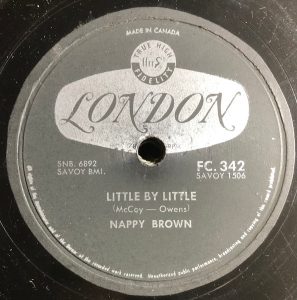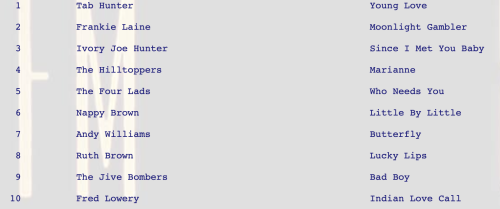#7: Little By Little by Nappy Brown
City: Dauphin, MB
Radio Station: CKDM
Peak Month: March 1957
Peak Position in Dauphin ~ #6
Peak position in Vancouver ~ did not chart
Peak Position on Billboard Hot 100 ~ #57
YouTube: “Little By Little”
Lyrics: “Little By Little”
Napoleon “Nappy” Brown Goodson Culp was born in 1929 in Charlotte, North Carolina. After his mother died, he was raised by family friends, Fred and Maggie Culp. He attended an AME Zion congregation. He later told a reporter, ” (I) just grew up religious. I got started singing when I was about nine years old in the choir at church. My dad was what you call a steward, and the bass singer in the choir.” In 1946, at the age of 16, he formed a gospel group with his cousins, the Golden Crowns, before moving on to the Golden Bell Quintet. From 1949 to 1954, Brown worked as a gospel singer with The Selah Jubilee Singers prior to switching to R&B. In 1954, he got a record deal with Savoy Records. His vocal style was recognizable, as Brown used a wide vibrato, melisma (singing a single syllable of text while moving between several different notes in succession), and distinctive extra syllables, in particular, “li-li-li-li-li.”
In 1955 he had a #2 R&B hit titled “Don’t Be Angry” which also climbed to #25 on the Billboard pop chart. On the Cashbox Best Selling Singles chart, “Don’t Be Angry” with both the Nappy Brown original, and the cover by the Crew Cuts, climbed to #9. The Crew Cuts cover of “Don’t Be Angry” reached #14 on the Billboard pop chart. The doo-wop group The Cadets also released a cover of the song in 1955.
Brown was an early influence on up-and-coming R&B singers, including Elvis Presley. According to his label Blind Pig Records, Elvis would go to Brown’s shows in 1955-56 in Memphis, Tennessee. Brown also had an influence on contemporary singer James Brown, as well as Otis Redding.
Nappy Brown next released “Piddley Pitter Patter” (also identified on some discs as “Pitter Patter”) which reached #10 on the R&B charts in the summer of ’55. The next four singles released by Brown failed to chart on either the R&B or pop record surveys. Late in 1956, Nappy Brown released “Little By Little”.

“Little By Little” was written by Rose Marie McCoy (nee Hinton). She was born in Oneida, Arkansas, in 1922. Her father was a farmer. She later married James McCoy and moved to New York City with $6 in her pocket to pursue a singing career in 1942. Living in Harlem, she supported herself by working at a Chinese laundry and performing at nightclubs on the weekends. McCoy eventually booked gigs at famous venues such as the Baby Grand in Harlem, the Flame Show Bar in Detroit, the Sportsmen’s Club in Cincinnati and Basin Street in Toronto. She opened for performers like Ruth Brown, Moms Mabley, Dinah Washington, and Pigmeat Markham.
In 1952, Rose Marie McCoy wrote and recorded two songs for the newly formed rhythm and blues label Wheeler Blues, “Cheating Blues” and “Georgie Boy Blues”. After publishers heard these songs they sought her out, and she started working in the Brill Building. One of the first songs she was asked to write was a half-spoken, half-sung song, “Gabbin’ Blues”, co-written with Leroy Kirkland, and sung by Big Maybelle with the spoken part provided by McCoy herself. “Gabbin’ Blues”, reached #3 in 1953 on the Billboard R&B chart, and was the first big hit for Big Maybelle and McCoy’s first hit. Later in ’53, Big Maybelle had a second Top Ten R&B hit with McCoy’s “Way Back Home”. In 1954, “It Hurts Me To My Heart” was Faye Adams last number-one R&B hit. McCoy also wrote a song titled “Mambo Baby” which Ruth Brown charted to number-one. While Big Joe Turner’s “Well All Right” was also a Top Ten hit thanks to Rose Marie McCoy’s savvy songwriting. In 1954, she wrote a song called “Trying To Get to You” which was recorded on RCA Victor by Elvis Presley.
In 1955, in addition to writing “Don’t Be Angry” for Nappy Brown, Rose Marie McCoy wrote “Don’t Take It So Hard”, a Top Ten hit for Earl King on the R&B chart. Late that year, Nat “King” Cole recorded “If I May”, which climbed to #8 on the Billboard pop chart.
In 1956, McCoy penned “Letter From My Darling” which became a Top Ten hit for Little Willie John. The following year, Nat “King” Cole recorded another Top 30 pop hit written by Rose Marie McCoy. It was titled “My Personal Possession”.
In 1958, she wrote the B-side to Elvis Presley’s number-one hit, “Don’t”, titled “I Beg Of You”. The song reached #8 on the Billboard Hot 100 and #4 on the Hot Country Singles chart.
Her last notable song was “It’s Gonna Work Out Fine”, recorded by Ike & Tina Turner. The single reached #2 on the R&B charts in 1961, and peaked at #14 on the pop charts. As well, Rose Marie McCoy wrote songs recorded by Brook Benton, Dinah Washington, Sarah Vaughan, The Drifters, Maxine Brown, Lenny Welch, Jerry Butler, Freddie Scott, Ruby & the Romantics, Etta James, LaVern Baker, The Shirelles, Jo Stafford, and others.
In the 70s, McCoy composed jingles, including one sung by Aretha Franklin and Ray Charles for Coca-Cola. McCoy was honored by Community Works NYC in their 2008 exhibition and concert series “Ladies Singing the Blues”. McCoy received a five-minute standing ovation during the award ceremony at the Cathedral Church of St. John the Divine in New York City for her contribution to music. To the delight of the audience, “It’s gonna work out fine” was played as she was escorted to the stage. In 2015, she died at the age of 92.
In 2017, Rose Marie McCoy was posthumously inducted into the Arkansas Black Hall of Fame. And in 2022, she was inducted into the Women Songwriters Hall of Fame.
“Little By Little” is a song about a number of physical signals that clue someone in that they’re in love.
1) “My eyes show what my heart knows”
2) “You kissed my lips, and my heart did flips”
As a consequence, he broadcasts the fact he’s going steady: “I tell the world that you’re my girl, and devote my life to you…”
“Little By Little” peaked at #1 in Detroit, #5 in Toronto, #6 in Dauphin (MB) and Baltimore, #10 in Arlington (VA) and Bethesda (MD), and #12 in Chicago.
In 1958, Nappy Brown returned to the Top Ten on the R&B charts with “It Don’t Hurt No More”. The single stalled on the Billboard Hot 100 at #89. In 1959, Brown had one more Top 30 R&B hit titled “I Cried Like a Baby”. His contract ended with Savoy in 1963. Aside from an album in 1969, little was heard from him.
In the early 1980s, a renewed interest in R&B led to some of Brown’s early songs being released on European albums. At the urging of Bob Margolin, former guitarist for Muddy Water’s band and a fan of Brown, Brown returned to the music industry. In 1983, Brown had a successful tour of Denmark, Finland, Norway and Sweden. In 1984, 14 years since his last recording, Brown signed with Landslide Records and released the album Tore Up, with The Heartfixers. The Buffalo News summed up Brown’s “chops here are as formidable as on his classic ’50s stuff.” Other recordings followed. This includes his 1987 release Something Gonna Jump Out the Bushes! The Commercial Appeal in Memphis concluded that the album shows “that it’s possible for a ’50s survivor to do something besides recycle past glories.” While Rolling Stone affirmed “Brown is in great, gruff voice.”
Brown’s 1955 Top Ten R&B hit, “Piddly Patter”, was featured in the John Waters 50s-themed teen romance film, Cry-Baby, starring Johnny Depp as leader of a gang called the Drapes. The film was later
Nappy Brown was inducted into the Blues Hall of Fame on August 24, 2002. His fourteenth and final album, Long Time Coming, was recorded in May 2007, with Blind Pig Records. The Washington Post wrote Brown “belts out jump tunes with the kind of robust authority the genre demands, delivers romantic ballad with crooning finesse and fully reveals his gospel roots when the spirit moves him.” While the Charleston Daily Mail reported, “having sung everything from jubilee gospel to rocking R&B, 78-year-old Brown effortlessly rummages through various blues styles.” The album was nominated for in the Traditional Blues Album of the Year category at the Blues Music Awards. While Nappy Brown received a nomination for Traditional Blues Male Artist of the Year.
Brown died in his sleep at the age of 78 in September 2008.
September 6, 2024
Ray McGinnis
References:
“Nappy Brown: Gospel singer who switched to rhythm ‘n’ blues and influenced James Brown and Otis Redding,” Independent, September 25, 2008.
Courtney Devores, “Blues, R&B singer Nappy Brown dies at 78,” Charlotte Observer, September 24, 2008.
Klye Deibler, “Nappy Brown: Long Time Coming,” Blues Bytes, December 2007.
“The Cashbox Best Selling Singles,” Cashbox, May 28, 1955.
Nappy Brown, “Don’t Be Angry“, Savoy Records, 1955.
Crew Cuts, “Don’t Be Angry“, Mercury Records, 1955.
Roger Ebert, “Cry-Baby,” Chicago Sun-Times, April 6, 1990.
“Blues Music Awards,” Tunica Reports, Mississippi, May 13, 2008.
Sam Roberts, “Rose Marie McCoy, a Songwriter for Rock, Pop and Jazz Legends, Dies at 92,” New York Times, January 31, 2015.
Lawrence Jones, “The First Real McCoy: A Small Sampling of Songs Written by Rose Marie McCoy,” DJLarsupreme.com, April 12, 2019.

CKDM 730-AM Dauphin (MB) Top Ten | March 23, 1957

Leave a Reply